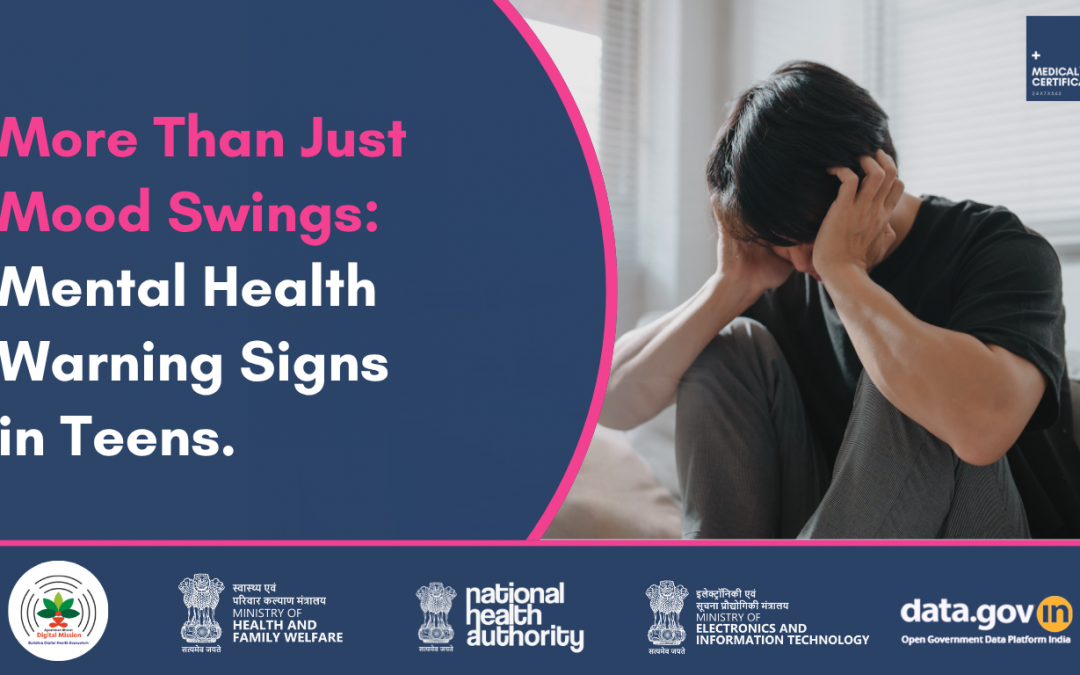She’s probably just making a fuss.
“It’s not long until they get over it.
Aren’t teenagers supposed to have mood swings?
We’ve all been familiar with these terms. It’s possible we’ve even used these words ourselves. But what would happen if that “moodiness” really meant something else? What would happen if a teen is battling with mental health and people around them miss it or worse, simply ignore it?
Adolescence brings a lot of challenges by itself. All these things hormones, changes in identity, school pressure, social life and nonstop technology make teenage life tough to deal with. When emotional difficulties are more than usual, they could point to bigger mental health problems.
We will look at important signs of mental health in teens, the reason why early detection matters and ways you can help young people using kindness and attention.
Why Mental Health in Teens Deserves Urgent Attention
According to the World Health Organization, about one in every seven children between 10 and 19 suffers from a mental health condition globally. Even so, most of these cases are never officially diagnosed or treated.
India’s National Mental Health Survey shows that out of 9.8 million adolescents between 13 and 17 years old, many require immediate mental health support. Numbers are also troubling in countries outside the United States.
It’s also important to know it’s not only about statistics. When teen mental health problems are not addressed, they can cause issues at school, damage relationships, harm a young person’s confidence, cause physical issues and sometimes even result in self-harm or suicide. Suicide has become one of the biggest causes of death among teenagers everywhere.
Mental Health vs. “Normal Teen Behavior”: The Fine Line
Indeed, adolescents are expected to sometimes be irritable or disengaged—this is part of their development. However, developments are temporary emotional reactions, and long-lasting debilitating symptoms are not the same thing.
If you are a parent, teacher, sibling or friend, you don’t have to be a psychologist to see signs that something may be off.
There are a few signs that could show someone is having serious mental health problems.
10 Mental Health Red Flags You Shouldn’t Ignore in Teens
1. Mood Swings that Happen Quickly and are Stark
Sometimes, teenagers exhibit mild irritability, though noticeable and frequent mood swings, without any obvious cause, indicate depression, bipolar disorder or anxiety.
It is common for an adolescent to switch from laughter to crying to anger many times during one hour, several times each week.
2. Social Withdrawal and the Decline of Pleasure in Doing Activities
Withdrawing from people often happens early on and remains a dependable sign of depression. Notice if a former sport or music enthusiast, in addition to being close to friends, withdraws all of a sudden.
Try not to assume it’s a part of getting older.
3. Sleep Patterns
If your teenager always spends their late evenings differently, but seems to face insomnia, nightmares or falls asleep in the daytime, it could point to an emotional issue.
Wake up calls may not be enough; if you regularly feel weary or can’t get up despite sleeping enough time, pay attention.
4. School performance is getting worse.
Someone who stops attending class, is absent from deadlines or shows poor grades could be dealing with anxiety, depression or a focus disorder.
Don’t start with disciplining your child. Start the process by having a discussion.
5. Changes in the way people eat or their weight
Signs that someone is experiencing an eating disorder or emotional stress are eating too much or too little, gaining or losing weight excessively or being very concerned with how they look.
While some do talk about body concerns, most teenagers prefer to be careful about how much they share—be aware of how they behave.
6. Had Self-Injury or Made Suicidal Threats
Always “attention-seeking.” Cutting or burning on the body is usually an attempt to distract from intense emotional pain.
Should a teenager admit they think they are a burden, have no hope or just wish to disappear—take the signs seriously. Always.
7. Sometimes we get very anxious or have a panic attack.
People with GAD in their teenage years often worry much about subjects at school, their friends and family issues. Experiencing a panic attack is not rare and involves quick onset breathlessness, dizziness and sometimes chest pain.
They’re real problems your partner has—try not to dismiss them as simply drama.
8. Substance Use
Using alcohol, tobacco or drugs might be a way people try to deal with their feelings. Early discovery of the behavior can guide it in a better direction, before it becomes addictive.
Sometimes these threats are signs that there is more going on than we realize.
9. Having Too Many Doubts
Most often, teenagers who say they are hearing or seeing strange situations, are being supervised without reason or have unusual fears show signs of psychosis or schizophrenia.
For this reason, these issues need to be taken care of quickly by professionals.
10. Giving yourself harsh words and little worth
If a teen keeps repeating that they are worthless, people don’t like them or they aren’t good at anything, they might have depression or anxiety.
Be alert for repeated feelings of self-blame, trying to be perfect or avoiding being with people.
What to Do If You Notice These Signs
Have dinner with them, keep your speech constructive rather than harsh. I have noticed that you seem different lately. Do you want to discuss what’s on your mind?
Be silent while they convey their message. Don’t try to fix the laptop if it gets stuck. Getting your message across can be very healing on its own.
Do Not Minimize: Saying “You will be okay” or “This is something that happens to everybody” can shut them up. Instead, acknowledge their feelings.
Seek Professional Help: Speak with a child psychologist, school counselor, or mental health hotline. Early intervention makes everything heal.
Get Involved and Stay Active: Check in from time to time. Be there. Remind them that they’re not alone and help exists.
When to Seek Immediate Help
If a teen is
- Discussing suicide
- Discussing wanting to die
- Actively harming themselves
- Exhibiting psychotic symptoms
Call a mental health worker or emergency right away. Don’t delay.
Final Thoughts: Your Support Can Save a Life
Although teen mental illness may be complicated, it is never invisible. If we pay attention and are considerate, we might be the reason a person feels able to heal.
Teens might not tell you they’re having a hard time—their actions often tell you instead.
Listen. Watch. Reach out.
Sometimes, early help for mental health can make a big difference in someone’s future.

